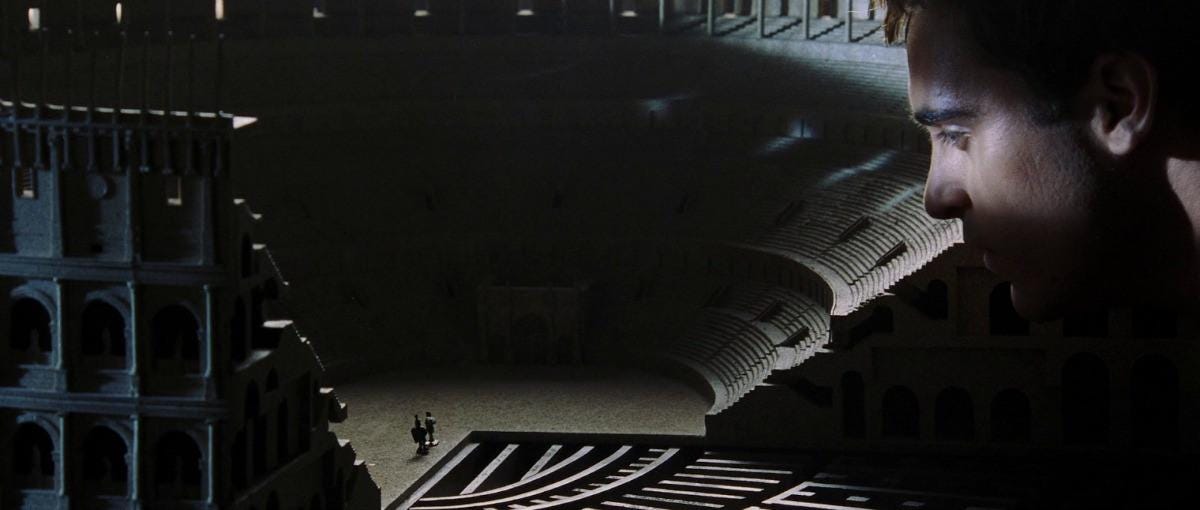100 Movies Every Catholic Should See #61: Gladiator (2000)
Directed by Ridley Scott. Starring Russell Crowe.
Marcus Aurelius’ Meditations have perhaps, in these modern times, become a bit of a cliche, but there’s an eternal wisdom to those words penned thousands of years ago that has appealed to the curiosity of many a man over the centuries. While Aurelius’ idea of Stoicism is not completely in line with some of the tenets we hold in the Church, his emphasis on the virtues is as much in line with Aristotle as it is with Aquinas.
In Ridley Scott’s 2000 masterpiece, Gladiator, Marcus Aurelius himself is played by veteran thespian and screen legend Richard Harris in one of his final roles, and like the role of King Lear who Harris probably portrayed many times, he has three children, but only two of them by blood. Those would be Commodus (Joaquin Phoenix) and Lucilla (Connie Nielsen), the latter of whom is survived only by her late husband’s son, Lucius Verus (Spencer Treat Clark). The third child is not the actual son of Aurelius, but his top general Maximus Decimus Meridius (Russell Crowe), in whom he sees many of the virtues he finds lacking in his real son.
In the scene that catalyzes the entire plot of the film (without spoiling too much) Commodus confronts his aging father in his tent while Aurelius’ troops are staying in the woods of Germanic Vindobona, where they are campaigning. The emperor’s son is imploring his father for the love that was never shown to him as a child, and asks him in an impassioned monologue why this was:
You wrote to me once, listing the four chief virtues: Wisdom, justice, fortitude and temperance. As I read the list, I knew I had none of them. But I have other virtues, father. Ambition. That can be a virtue when it drives us to excel. Resourcefulness, courage, perhaps not on the battlefield, but... there are many forms of courage. Devotion, to my family and to you. But none of my virtues were on your list. Even then it was as if you didn't want me for your son. I search the faces of the gods... for ways to please you, to make you proud. One kind word, one full hug... where you pressed me to your chest and held me tight. Would have been like the sun on my heart for a thousand years. What is it in me that you hate so much? All I've ever wanted was to live up to you, Caesar.
I’ve seen this film several times, and out of all the fantastic scenes, this one is one of my favorites. Interestingly enough, after checking out the second draft online by John Logan I didn’t find this monologue, which is a testament to Ridley Scott’s method of filmmaking: while he is an avid storyboarder and plans his shoots like a Roman military commander himself, he is always open to writing out scenes on the spot along with his actors, and it’s quite possible Joaquin Phoenix, who was nominated for an Oscar for his performance here, helped improvise these lines on set.
Commodus’ perception of masculinity and success is at odds with Maximus, who wants nothing more for the Germanic Wars to be over so he can return to his farm in the hills of Trujillo (modern-day Spain) to be with his beloved wife and son. The Roman general is a simple man, effective at killing but only ever out of necessity: when visiting Senator Falco (David Schofield) suggests to Maximus that he should consider taking a position of government in Rome, he bluntly answers “I’m a soldier, not a politician” and leaves it at that. Commodus’ desire to become someone worthy of his father has warped him into someone who sees such power and connections as routes to happiness, but his self-loathing bred from an entire childhood of being treated as second-rate has allowed no seeds of charity or kindness- two important traits in a truly great man- to take root. The more I watch Gladiator, the more I feel for Commodus: though the evil actions he takes throughout the film can never be justified, his story is a story about what happens when fathers do not take the time to truly be with their sons, and therefore makes the film into a cautionary tale.
Gladiator stands as one of the greatest films ever made and has only ever improved upon every subsequent rewatch: nobody makes a historical epic quite like Ridley Scott. Russell Crowe won the Oscar for Best Actor for his portrayal of the virtuous pagan, Maximus, and its probably the best performance he’s ever done. Maximus’ journey to avenge those he ends up losing is riveting, and he is amiably supported by both the late great Oliver Reed as Antonius Proximo, a former gladiator who now trains other gladiators, and always-reliable character actor Djimon Hounsou as Juba, a fellow gladiator. Without giving away too much, in a tragic turn of events, Maximus finds himself going from general to slave, and the only path to his freedom- and vengeance- comes to him in the form of the gladiatorial arena.
It’s a timeless story produced in an era where it was common to see such noble virtues portrayed in the cinema, released not long after Mel Gibson’s Braveheart and right before The Lord of the Rings. With early positive buzz floating around about Scott’s follow-up Gladiator II, I am hopeful we will one day return to making movies about real heroes, who give it all for their faith and family.





